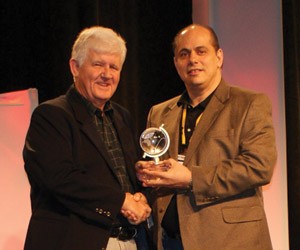For the International Association of Conference Centers (IACC), business as usual once longtime Executive Vice President Tom Bolman retires should be anything but usual.
Bolman, who began his tenure with IACC as executive director in 1986 and was promoted to executive vice president in 1996, is scheduled to leave by the end of year, and with the changing of the guard, IACC plans to greatly increase its global presence and create a new CEO position to helm the association.
In an interview at the association’s Annual Conference March 20-23 at the Houston area’s La Torretta Lake Resort & Spa, the head of the task force leading the transition, Peter Stewart, global president of IACC and director of operations at Australia’s Macquarie Graduate School of Management, said IACC will greatly expand its global presence.
“We really discovered that we need to focus more globally,” Stewart said. “It actually strengthens the brand of IACC.”
Stewart said that the association is creating an Asia/Australia chapter—Benchmark Hospitality International recently opened its second conference center in Tokyo—to tap the potential of the rapidly growing area, and has made an allowance to add an Africa/Middle East chapter. He identified China and South Korea as other areas ripe for expansion; the association already has a healthy presence in Europe.
IACC also recently received a membership application from a company that represents South African conference centers.
According to Stewart, the association will form a committee that will start the selection process for a new CEO by the end of April, and hopes to have someone in place by June or July.
Stewart added that the association could move forward with an interim CEO, but does not consider that an ideal solution. He also said that he will not be a candidate for the new position.
The ideal candidate, he said, will be chosen from a global field of candidates, and will have the primary mission of expanding IACC’s worldwide reach.
Because the new hire could be based anywhere, the association’s headquarters could move from St. Louis, where it currently has four staff members. Stewart said no decision has been made as to a headquarters move, but the possibility of relocating in an “international city” such as New York or Tokyo has been discussed.
Because of the global push, IACC’s Universal Criteria—a stringent set of qualifications members must meet to join the association—recently were renamed “quality standards” to make the items more about the entire experience of a meeting and less about just the furnishings and finishes of a building.
The worldwide focus also is giving way to a revamped Quality Committee that will make membership application decisions, taking into consideration local standards, Stewart said.
“There are different interpretations in different countries,” Stewart said. “There needs to be some flexibility, [to] have a minimum number of standards and then chapters will be free to add criteria. If they want to make it stronger, then they can have that.”
Stewart said that the membership application process will include peer review to make sure the applicant is a serious conference facility. “We don’t see any dilution of the standard at all,” he stressed, adding that the evolving preferences of clients and new technology will require the association to expand its horizons internationally to include non-traditional conference facilities.
“Are we going to meet the client demands or stick rigidly to what we believe in?” he asked. “That’s what the Quality Committee will be looking at—those trends.”
Stewart said that meeting planners can expect the same high level of quality currently offered at its member properties, regardless of where they are located.
“Meeting planners should know that what IACC is doing is taking what they all know and respect to a broader audience, and creating a seamless connectivity between members and chapters,” he said. “Meeting planners can go into these other areas with confidence where they wouldn’t have had it before.”




